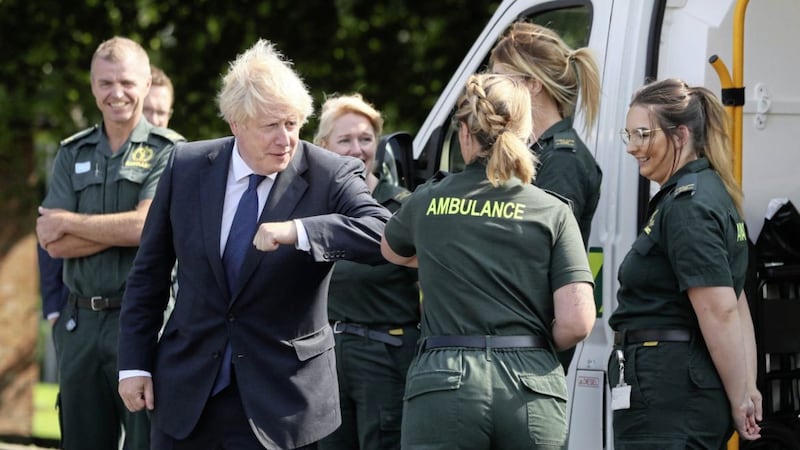So, how do you celebrate when almost half of the people you rub shoulders with don't want to celebrate: don't even want an invitation to the gig?
That's the question facing the leaders of local political unionism right now, as they finalise plans to 'party on down' and celebrate 100 years of Northern Ireland and its place within the United Kingdom.
Most of the key players within republicanism and nationalism have already made it clear they're not in a party mood.
Michelle O'Neill has said she's willing to engage in a conversation about the failures of partition; but that's a bit like inviting a teetotaller to make the keynote speech at the opening of a brewery. Boris Johnson, meanwhile, has promised to establish a panel and forum to organise events to celebrate the union he 'loves', yet Johnson, thanks to his spectacularly cack-handed response to the Brexit process, is about as useful in this context as a fox in a chicken house.
Arlene Foster will not be able to make a speech in the Assembly on behalf of the unionist majority, because there isn't a unionist majority in the Assembly. That was lost in 2017. Two years later unionist MPs returned from Northern Ireland were in the minority. She won't be able to talk about the solidity of NI's constitutional position within the UK because Boris Johnson's agreement to a border down the Irish Sea means NI will not be treated exactly the same as England, Scotland and Wales from next January. Worse, it is being treated differently even though Johnson came to Belfast and assured a DUP conference audience he wouldn't allow NI to be treated like a colony.
The problem for local unionism is that the reasons for celebration seem limited. It has been betrayed by successive UK governments since 1921, most recently by the very Conservatives the DUP propped-up for almost three years. At the back of many unionist minds lurks the suspicion that Johnson would probably let both Scotland and Northern Ireland go in return for getting Brexit done. Also at the back of their minds is the more worrying suspicion that he would throw them to the mercy of a border poll if NI became a problem.
It would be too easy, by the way, to say that everything would now be so much better for unionism if the DUP hadn't championed Brexit and then gone uber-unionist between 2016-20. But nationalism and republicanism still wouldn't be celebrating the centenary. Scottish nationalists would still be pushing just as hard for independence. If the Brexit result had been reversed there would still be a rebooted, insular form of English nationalism (possibly a more virulent strain). The response to Covid-19 would still have exposed divisions between the various parts of the UK.
I've noted before in the column the problem of keeping the competing nationalisms within the UK harnessed together. What the UK lacks - and it has been increasingly noticeable since the end of the 1960s - is something that can be easily recognised as a pan-UK identity: something that is bigger and broader than regional identities, but doesn't smother them.
In Northern Ireland's case, for instance, 'Ulster' unionism was allowed to operate almost entirely within its own orbit, drifting further and further away into a 'place apart' identity. And the difficulty with that was that it alienated small-n nationalists who had no particular problem with the Union, but who weren't happy with how it was manifested through the institutional/electoral/political vehicles of 'Ulster' unionism.
The push towards devolution from the mid-1990s in Scotland, Wales and NI diluted a pan-UK identity, encouraged independence movements in Scotland and here, and regenerated an English nationalism which increasingly questioned both the loyalty and expense of the 'Celtic fringes.' Even if Brexit wasn't happening we would still be facing the same constitutional crisis across the UK.
Which leaves the question: what, exactly, is being celebrated in 2021 in Scotland, England, NI and, to a smaller extent, in Wales? Are we celebrating the unity and collective identity of the UK, or will it be more of a post mortem? The leaders of unionism in all four corners of the UK have yet to produce answers to those questions.
My personal concern is with Johnson: he is obviously the leader of English nationalism, yet I'm not persuaded he is a genuine champion of the UK or pan-UK unionism. 2021 is shaping up to be a much more important year than 1921.








